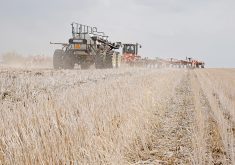Farmers could face the loss of grain payment deferrals in the next few years.
The 2017 federal budget announced a consultation on possibly ending this tax mechanism for grain farmers.
The history behind this tax deferral on listed grains was linked to the Canadian Wheat Board’s quota delivery system.
When the listed grains, which include wheat, oats, barley, rye, flax and canola, are delivered, the elevator can issue either a cash ticket or deferred cash ticket payable in the following year.
Now that the CWB has been dismantled and wheat is sold on the open market, the federal government feels the deferral program is an unfair advantage.
Read Also

Higher farmland taxes for investors could solve two problems
The highest education and health care land tax would be for landlords, including investment companies, with no family ties to the land.
How would this affect your farm?
Currently, if you sell listed grain commodities, you can deliver it to the elevator and defer receiving payment until the next taxation year, deferring the tax one year.
Changes could result in a taxable sale occurring once the commodity is delivered to the elevator. Therefore, for tax planning at year end, you would need to change when you deliver grain versus when you receive the cash. This would be similar to the principle that applies when selling cattle.
This does not mean farmers would no longer be on the cash basis. If the product is in your bin at home, you would not need to recognize this as a sale.
If the system ends, grain producers who have used large deferrals at year end would be stuck with capturing two years of grain sales in one year. Producers may want to consider tax mechanisms such as optional inventory to plan for this potential change.
The government would like your comments on the deferral system. You can send your comments by email to consultation_tax_2017@canada.ca.
The government has also begun consultation on income sprinkling.
This is a common tax plan that involves family members owning different classes of shares of the farming corporation.
Any shareholder is entitled to dividends any time of year. Depending on their tax bracket, a family can pay less tax overall by splitting income.
The government would like to establish more strict guidelines to prevent income from splitting in this fashion.
The actual changes in the 2017 budget likely will not have a huge impact on your operations. This has been coined the “Watch and Wait” budget.
However, the changes that may affect your farm include:
- Factual control — This is a definition that is used in the rules to determine if you are associated with other corporations to share the $500,000 small business deduction. The budget has made these rules more broad, which may mean more risk for complex corporate structures.
- Ecological gift programs — Landowners currently have the opportunity to donate land or provide an easement to not develop their land to receive a donation receipt and potentially cash. There are now stiffer rules if this is violated with a penalty of 50 percent tax.
- Tuition tax credits — You can now receive tuition tax credits to develop your occupational skills just as university students would for their tuition.
The budget also announced that over the next five years the government is increasing the amount of verification activities, hiring additional auditors and specialists and developing business intelligence to target tax avoidance cases.
Consult with a tax professional to comply with the ever changing tax laws.
Riley Honess contributed to this article.
Colin Miller is a chartered accountant and partner with KPMG’s tax practice in Lethbridge. Contact: colinmiller@kpmg.ca.














